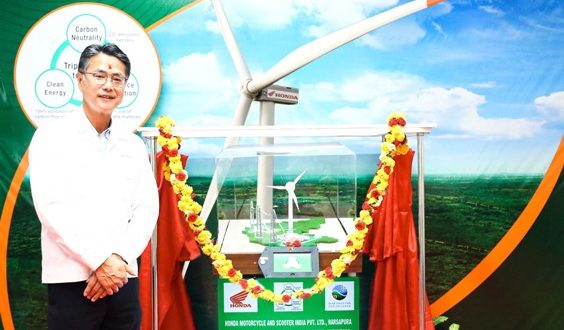TBB BUREAU
BENGALURU, AUGUST 24, 2022
Continuing its endeavours towards reducing dependence on non-renewable resources by leveraging clean energy systems (wind & solar), Honda Motorcycle & Scooter Indiainaugurated its third wind turbine system at Jagalur in Davanagere district of Karnataka, around 300kms from the company’s third plant in Narsapura.
Standing tall at 130m, the 2.7 MW wind turbine will generate 75 lakh kWh of energy annually thus enabling HMSI’s Narsapura manufacturing plant to reduce carbon emissions by more than 5400 tons per year.

Noteworthy, HMSI will now produce a total of 7.4 MW wind energy including its wind turbine systems installed in Gujarat at Radhanpur(2MW capacity) and Bhanvad(2.7 MW capacity).
Speaking on HMSI’s initiative towards usage of renewable energies, Honda Motorcycle & Scooter India Managing Director, President & CEO Atsushi Ogata said, “Since the beginning, HMSI has been committed towards integrating cleaner & greener technologies in all aspects of manufacturing. This wind turbine installation at our Narsapura plant brings us a step closer towards achieving our environmental goal of carbon neutrality for all products and activities by 2050. We continue to strengthen our carbon reduction vision through energy efficient technologies and renewable energy initiatives.”
Further broadening its approach towards renewable energy, HMSI is consistently investing in sustainable resources for power generation. With a cumulative renewable energy capacity of over 67 MW, all HMSI manufacturing facilities across India utilizes this energy for meeting the its diverse energy requirements. In FY’21-22, HMSI utilised more than 87 Million kWh units’ electricity generated from renewable resources.
HMSI’s Narsapura plant in Karnataka initiated the procurement of renewable energy through Third Party Power Purchase agreement in 2017. Further sustaining the stewardship in environment excellence, Narsapura plant commissioned a 7 MW solar roof top facility in 2019 which was later expanded to 9.5 MW. In addition to this, it also has 300 solar concentric dishes which replace thermal fuel with renewable energy. With the new 2.7 MW wind turbine, the facility’s combined renewable energy capacity is now more than 42 MW and caters to 95% of its total electrical energy requirements. This will lead to avoidance of more than 44,000 tons of carbon emissions per year thus enabling the Narsapura plant to sustain its position as the benchmark in carbon emissions reduction among group companies in Asia & Oceania region.
 The Business Bytes
The Business Bytes
